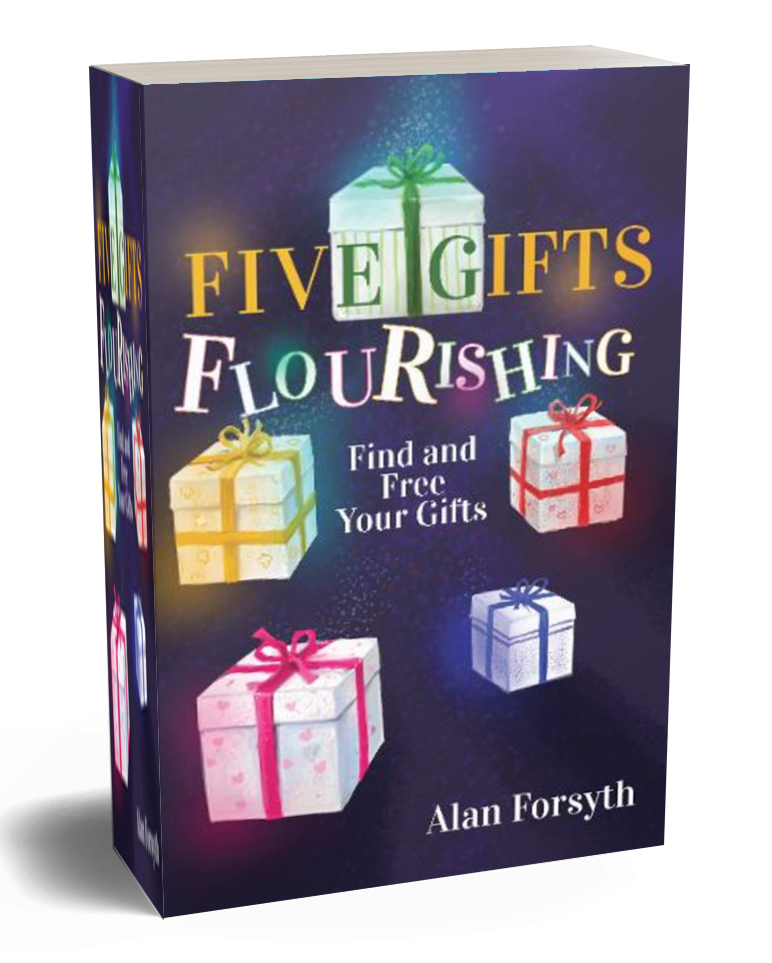In preparing to write Five Gifts Flourishing, I dissected my over thirty years’ experience helping organisations and individuals to change. Consistently I found that a willingness to view the self or the environment from more than just one perspective was essential if change and transformation were to occur.
If the only tool you have is a hammer, you tend to treat everything as if it were a nail. Abraham Maslow.
Thinking about this willingness to observe ourselves or indeed the world differently I developed the idea of gifts, as a vehicle for change. Gifts represent an ideal way to explore the world and ourselves and truly generate change, sustainable change based on fresh perspectives.
Viewing personal and collective change through the filter of gifts provides many distinct advantages.
Gifts are inherently positive, mainly offered without expectation of reciprocation. Often referred to as attributes or skills that may be bestowed on someone or within someone, they describe a flair or talent that may exist now, be developed or refined in the future.
When people describe the gifts of others, these are always positive observations often warmly shared out of gratitude at weddings, parties and celebrations. People are impressed by and aspire to gifts they see embodied in others.
Gifts provide a way of framing the present and providing possibilities for the future. And they are also used as a way to acknowledge the past. Just consider some recent eulogies you may have heard or read, the gifts of those no longer living celebrated and remembered in death.
We are aware of human gifts, yet have not really considered them as a way to frame personal or community growth and change. Not yet. My own study and research in change and transformation allowed me to access two substantial bodies of work, ontology and mindfulness. Ontology, the study of what it is to be human, poses some interesting interpretations, one of which being that the world does not occur out there, it only occurs in here. In other words, we exclusively and continuously create the world, in our own heads. As a result, we have the ability to determine what does exist in our heads and how that can be either endured or changed. Similarly, the study of mindfulness and indeed meditation prepares us to take control in determining our lives, our focus, our intent and our gratitude regardless of what happens around us.
We gain a sense of control and responsibility from the ontological and mindful perspectives, suggesting we have more choice in creating the life we want that perhaps previously thought.
Additionally, in the world of contemporary psychology, especially positive psychology, there have been growing evidence of the utility of focusing on not what is wrong with human beings to help address concerns, but what can be created by people.
My idea of using gifts to contribute to this sense of autonomy in changing our own worlds stands on the shoulders of ontology, mindfulness and contemporary psychology and I believe add to the wisdom inherent in those domains.
We can define our own gifts and use these as a way to help us as individuals create focus meaning and direction in our lives. Given the close association of values and gifts, it is fair to say that a life crafted on gifts will be inherently values based and likely to be more affirming or more meaningful than not.
One of my gifts is being a learner. Based on my aspiration for personal growth and being my best always, this gift has helped me on many occasions in living a flourishing life. As a first-time dad at home, when my youngest son was just one year old, I approached this opportunity as a learner, simply not knowing what it would take to be a father at home. Thirty years later and many stints as dad at home in between and I know deeply that my ability to be a learner, to be vulnerable and not know everything has paid dividends now, with all of my boys choosing to spend time together with their dad now.
My hypothesis of gifts as a useful lens to generate transformation can also apply more widely in gaining clarity on some of the bigger issues we are grappling with right now. Issues like gender and gender equality for example. What are the gifts that reside in men and women separately and together that could contribute to a greater sense of gender equality? That could have men and women cohabit and co-create without angst, rather with respect and a deep concern for the future?
Using gifts to help explore broader issues or concerns may well help us to step beyond myopic solutions, and help strip polarity and ego out of such conversations.
I further hypothesise that finding and freeing your gifts will fundamentally open you to new, genuinely meaningful opportunities in your life.
Please, I invite you, get a copy of the book, enjoy the stories, the evidence and the activities or come along and attend a workshop, ready to engage in a new way of personal transformation.
Alan Forsyth.
